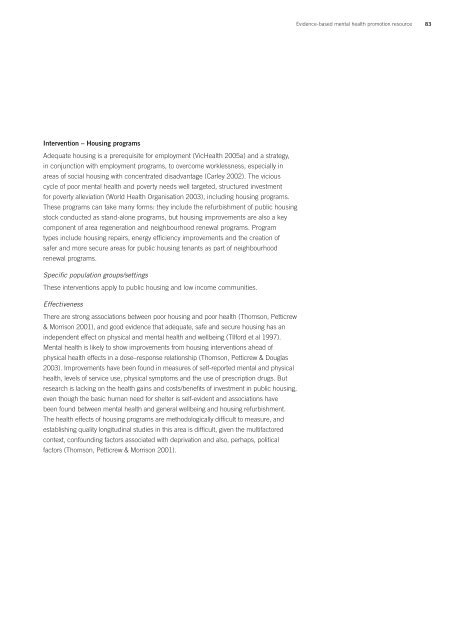Evidence-based mental health promotion resource - health.vic.gov.au
Evidence-based mental health promotion resource - health.vic.gov.au
Evidence-based mental health promotion resource - health.vic.gov.au
You also want an ePaper? Increase the reach of your titles
YUMPU automatically turns print PDFs into web optimized ePapers that Google loves.
<strong>Evidence</strong>-<strong>based</strong> <strong>mental</strong> <strong>health</strong> <strong>promotion</strong> <strong>resource</strong>83Intervention – Housing programsAdequate housing is a prerequisite for employment (VicHealth 2005a) and a strategy,in conjunction with employment programs, to overcome worklessness, especially inareas of social housing with concentrated disadvantage (Carley 2002). The <strong>vic</strong>iouscycle of poor <strong>mental</strong> <strong>health</strong> and poverty needs well targeted, structured investmentfor poverty alleviation (World Health Organisation 2003), including housing programs.These programs can take many forms: they include the refurbishment of public housingstock conducted as stand-alone programs, but housing improvements are also a keycomponent of area regeneration and neighbourhood renewal programs. Programtypes include housing repairs, energy efficiency improvements and the creation ofsafer and more secure areas for public housing tenants as part of neighbourhoodrenewal programs.Specific population groups/settingsThese interventions apply to public housing and low income communities.EffectivenessThere are strong associations between poor housing and poor <strong>health</strong> (Thomson, Petticrew& Morrison 2001), and good evidence that adequate, safe and secure housing has anindependent effect on physical and <strong>mental</strong> <strong>health</strong> and wellbeing (TIlford et al 1997).Mental <strong>health</strong> is likely to show improvements from housing interventions ahead ofphysical <strong>health</strong> effects in a dose–response relationship (Thomson, Petticrew & Douglas2003). Improvements have been found in measures of self-reported <strong>mental</strong> and physical<strong>health</strong>, levels of ser<strong>vic</strong>e use, physical symptoms and the use of prescription drugs. Butresearch is lacking on the <strong>health</strong> gains and costs/benefits of investment in public housing,even though the basic human need for shelter is self-evident and associations havebeen found between <strong>mental</strong> <strong>health</strong> and general wellbeing and housing refurbishment.The <strong>health</strong> effects of housing programs are methodologically difficult to measure, andestablishing quality longitudinal studies in this area is difficult, given the multifactoredcontext, confounding factors associated with deprivation and also, perhaps, politicalfactors (Thomson, Petticrew & Morrison 2001).



